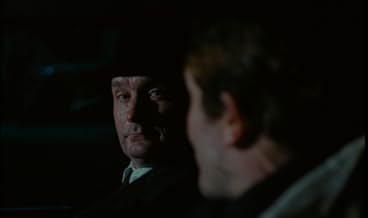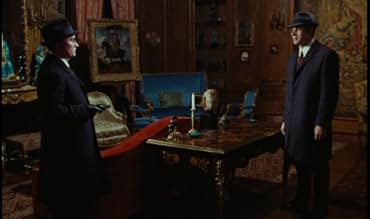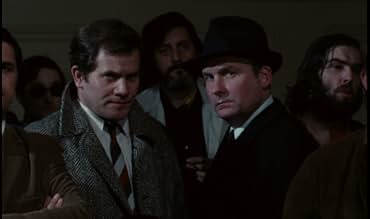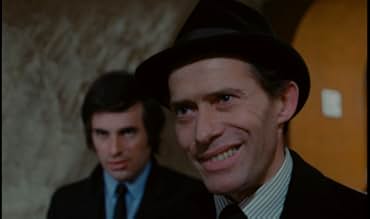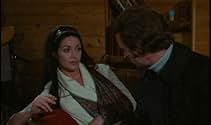अपनी भाषा में प्लॉट जोड़ेंWhile investigating a drug case, an inspector is shot dead by a gangster. His colleague, Inspector Favenin, is assigned to solve this crime. He is ready to do anything to save his colleague'... सभी पढ़ेंWhile investigating a drug case, an inspector is shot dead by a gangster. His colleague, Inspector Favenin, is assigned to solve this crime. He is ready to do anything to save his colleague's honor, even if it means going beyond the law.While investigating a drug case, an inspector is shot dead by a gangster. His colleague, Inspector Favenin, is assigned to solve this crime. He is ready to do anything to save his colleague's honor, even if it means going beyond the law.
Gianni Garko
- Dan Rover
- (as John Garko)
Anne Carrère
- Christine
- (as Anne Carrere)
Théo Sarapo
- Lupo
- (as Theo Sarapo)
Jean-Claude Bercq
- Germain
- (as Jean-Claude Berck)
Stéphan Holmes
- Le jeune garçon
- (as Stephan Holmes)
फ़ीचर्ड समीक्षाएं
Yves Boisset's "Un condé" (from the French slang for cop) is a sort of Gallic "Dirty Harry", a police thriller that raises awkward questions about how far across the line the good guys can step in order to clear up society's mess. Inspector Favenin (Michel Bouquet) undoubtedly goes too far. When his idealistic but ineffectual partner is killed pursuing the culprits of a gang revenge attack (a pursuit instigated by Favenin himself), the embittered cop, realising that conventional police methods won't work, takes matters into his own hands.
At first, it's hard to resist cheering as he takes on the worst of the gang thugs using their own methods. But when his ruthless pursuit for revenge starts to impinge on the more sympathetic characters in the story, including an essentially decent man who gets beaten up in front of his young son, we are forced to question where our sympathies lie.
Boisset's functional, low-key direction, while lacking the stylistic flamboyance of Melville, serves the story well, and makes the frequent outbursts of violence all the more shocking. Bouquet is well-cast as the soft-spoken, solitary, buttoned-up and near-psychopathic Favenin, a more complex (and scarier because unpredictable) character than Eastwood's Harry Callahan. Whereas in "Dirty Harry" the hero's methods are questionable but his goals are morally correct, Favenin clearly has more personal motives that are not necessarily consistent with the public good. Even so, his pragmatic boss is willing to overlook his actions provided they can be covered up.
In a minor role, Michel Constantin, a stalwart of many French gangster movies, gives one of his best performances here as a fatalistic hired gun; his confrontation with Favenin is a highlight of the film.
At first, it's hard to resist cheering as he takes on the worst of the gang thugs using their own methods. But when his ruthless pursuit for revenge starts to impinge on the more sympathetic characters in the story, including an essentially decent man who gets beaten up in front of his young son, we are forced to question where our sympathies lie.
Boisset's functional, low-key direction, while lacking the stylistic flamboyance of Melville, serves the story well, and makes the frequent outbursts of violence all the more shocking. Bouquet is well-cast as the soft-spoken, solitary, buttoned-up and near-psychopathic Favenin, a more complex (and scarier because unpredictable) character than Eastwood's Harry Callahan. Whereas in "Dirty Harry" the hero's methods are questionable but his goals are morally correct, Favenin clearly has more personal motives that are not necessarily consistent with the public good. Even so, his pragmatic boss is willing to overlook his actions provided they can be covered up.
In a minor role, Michel Constantin, a stalwart of many French gangster movies, gives one of his best performances here as a fatalistic hired gun; his confrontation with Favenin is a highlight of the film.
Yves Boisset directs "Un Condé" with remarkable succintness and efficiency. To that end he is greatly assisted by Michel Bouquet's deadpan, top drawer performance, who in turn is well supported by Bernard Fresson, Adolfo Celi, Gianni Garko and the beautiful Françoise Fabian.
Inspector Favenin's character is built layer by layer and Bouquet emerges very convincingly as a copper doubling up as vigilante. The script is very good, with sharp dialogue, including copper talk in French. It would appear that this film provided some inspiration for DIRTY HARRY the following year and DEATH WISH in 1974.
Very competent and economical cinematography, reminiscent of Don Siegel's straightforward punches pulled approach to action.
I strongly recommend this film to anyone interested in film noir and in the French cinema.
Inspector Favenin's character is built layer by layer and Bouquet emerges very convincingly as a copper doubling up as vigilante. The script is very good, with sharp dialogue, including copper talk in French. It would appear that this film provided some inspiration for DIRTY HARRY the following year and DEATH WISH in 1974.
Very competent and economical cinematography, reminiscent of Don Siegel's straightforward punches pulled approach to action.
I strongly recommend this film to anyone interested in film noir and in the French cinema.
The basic motif to see it remains the admirable job of Michel Bouquet. A film about friendship, duty and corruption , simple, precise and using cold tones.
A cop is killed.
His colegue looks for the murderer, using all tools for find him.
Nothing new but seductive for the cinematography and for the wise way to use American model, giving to it profound nuances.
A film about guilty, to.
Interesting for the exploration of characters.
A cop is killed.
His colegue looks for the murderer, using all tools for find him.
Nothing new but seductive for the cinematography and for the wise way to use American model, giving to it profound nuances.
A film about guilty, to.
Interesting for the exploration of characters.
Yves Boisset is not one of the famous French directors, which amplifies for me the (pleasant) surprise of watching his 1970 film 'Un condé' ('The Cop'). The director, who had been Jean-Pierre Melville's assistant, among others, demonstrates here that he not only learned many of the secrets of the trade from his master, but also that he had the courage to combine the genre of film noir (a tradition in French movies) with political cinema. The result makes of 'Un condé' both violent entertainment in the genre of the movies in which the cops are only a little less evil than the gangsters they face, and a political film in which a crisp message and characters immersed in moral corruption. In perfect synchronicity with what was happening at the same time in American cinema, 'Un condé' brings to the screen a vigilante hero with whom, as spectators, we identify for a while, until the moment the violence accumulates and we begin to question whether justice achieved through such illegal means remains justice, even in situations where there seems to be no alternative to the use of violence.
I liked the way this story is told. It starts with a settlement of accounts in the underworld between a gang of mobsters who do not hesitate to use any kind of violence to achieve their goals and the owner of a place who refuses to give up and pays with his life. When his sister and his best friend decide to take revenge, we, as spectators, cannot help but empathize with their feelings. A pair of policemen who seem incorruptible and who, because they are honest, are marginalized in a system that prefers to reach a 'modus vivendi' with criminals, comes into action. When one of them is killed by the same gang of mobsters, revenge seems justified, and again, as spectators, we are involved. The problem is that the world described in the film does not know clean methods to achieve its goals. Revenge means homicide, and police use Gestapo-like methods of interrogation. Made in 1970, 'Un condé' contains a strong post-1968 message of protest against police violence, which Yves Boisset will continue in his future films.
Made during the heyday of the 'film noir' genre in French cinema, a genre that had absorbed some of the talents of the New Wave, 'Un condé' is not inferior to many of the best-known achievements of the genre. The clear and intelligent script, the consistent visual conception and the fact that the characters are not morally judged for what they do contribute to this. They are committing atrocities for noble causes: friendship, fighting crime, opposing police corruption. If there is a culprit, this is the system that does not leave them too many alternatives. Michel Bouquet creates one of the best roles of his career and Michel Constantin adds another role to the ones that made him a favorite actor in gangster movies over several decades. I recommend the film, which in my opinion falls into the category of cinematic jewels that need to be rediscovered.
I liked the way this story is told. It starts with a settlement of accounts in the underworld between a gang of mobsters who do not hesitate to use any kind of violence to achieve their goals and the owner of a place who refuses to give up and pays with his life. When his sister and his best friend decide to take revenge, we, as spectators, cannot help but empathize with their feelings. A pair of policemen who seem incorruptible and who, because they are honest, are marginalized in a system that prefers to reach a 'modus vivendi' with criminals, comes into action. When one of them is killed by the same gang of mobsters, revenge seems justified, and again, as spectators, we are involved. The problem is that the world described in the film does not know clean methods to achieve its goals. Revenge means homicide, and police use Gestapo-like methods of interrogation. Made in 1970, 'Un condé' contains a strong post-1968 message of protest against police violence, which Yves Boisset will continue in his future films.
Made during the heyday of the 'film noir' genre in French cinema, a genre that had absorbed some of the talents of the New Wave, 'Un condé' is not inferior to many of the best-known achievements of the genre. The clear and intelligent script, the consistent visual conception and the fact that the characters are not morally judged for what they do contribute to this. They are committing atrocities for noble causes: friendship, fighting crime, opposing police corruption. If there is a culprit, this is the system that does not leave them too many alternatives. Michel Bouquet creates one of the best roles of his career and Michel Constantin adds another role to the ones that made him a favorite actor in gangster movies over several decades. I recommend the film, which in my opinion falls into the category of cinematic jewels that need to be rediscovered.
Tough-as-Cop thriller from a clearly not-so-belle France, moodily shot with a real flair for coolly capturing callous street justice by, Yves Boisset, whose terse, muscular mise-en-scène translates excitingly into a remarkably grim, morbidly fascinating French crime thriller. The legendary French actor, Michel Bouquet is genuinely chilling as the flinty L'inspecteur Favenin whose amoral and increasingly brutal journey to avenge the fruitless death of a fellow officer leads him ever deeper into a violent existential nightmare!
'Un condé' (1970) is a magnificently bleak, profoundly philosophical Gallic Euro-crime which works brilliantly as a savage expose of police barbarity, dealing unflinchingly with the ultimate societal conundrum; must one become like the beasts in order to deal with the beast? The only thing that marred my enjoyment of this wickedly immersive Gallic crime treat is that the source VHS print of my bootleg was a trifle muddy. An immaculately restored, UK-friendly, bells & whistles DVD/Blu-ray edition of this exquisitely cold example of gripping, abyssal dark 70s French policier is LONG overdue!
'Un condé' (1970) is a magnificently bleak, profoundly philosophical Gallic Euro-crime which works brilliantly as a savage expose of police barbarity, dealing unflinchingly with the ultimate societal conundrum; must one become like the beasts in order to deal with the beast? The only thing that marred my enjoyment of this wickedly immersive Gallic crime treat is that the source VHS print of my bootleg was a trifle muddy. An immaculately restored, UK-friendly, bells & whistles DVD/Blu-ray edition of this exquisitely cold example of gripping, abyssal dark 70s French policier is LONG overdue!
क्या आपको पता है
- ट्रिवियाAlthough his film is close to Pierre Lesou's novel, director Yves Boisset confessed that, during the scene between Michel Constantin and Michel Bouquet, he was influenced by Jean-Pierre Melville's films' atmosphere and dialogue.
- इसके अलावा अन्य वर्जनDue to pressure from then French Minister of the Interior Raymond Marcellin, the film had a tough time getting approved for release and director Yves Boisset was finally forced to cut a few lines of dialogue and reshoot the interrogation scene. The film was shown uncut and with the original scene internationally. In France, the original scene can be seen as a bonus feature on home video.
- कनेक्शनReferenced in Parole de cinéaste: Yves Boisset: le cinéaste le plus censuré de France (2013)
टॉप पसंद
रेटिंग देने के लिए साइन-इन करें और वैयक्तिकृत सुझावों के लिए वॉचलिस्ट करें
विवरण
- रिलीज़ की तारीख़
- कंट्री ऑफ़ ओरिजिन
- भाषाएं
- इस रूप में भी जाना जाता है
- The Cop
- फ़िल्माने की जगहें
- Fourges, Vexin-sur-Epte, Eure, फ़्रांस(ending scene at the water mill)
- उत्पादन कंपनियां
- IMDbPro पर और कंपनी क्रेडिट देखें
- चलने की अवधि1 घंटा 35 मिनट
- ध्वनि मिश्रण
- पक्ष अनुपात
- 1.66 : 1
इस पेज में योगदान दें
किसी बदलाव का सुझाव दें या अनुपलब्ध कॉन्टेंट जोड़ें

